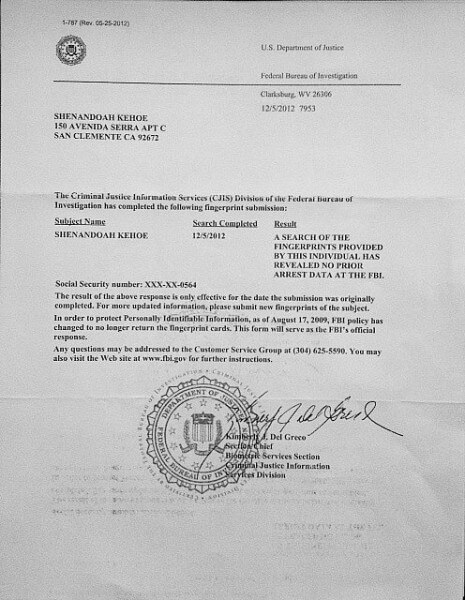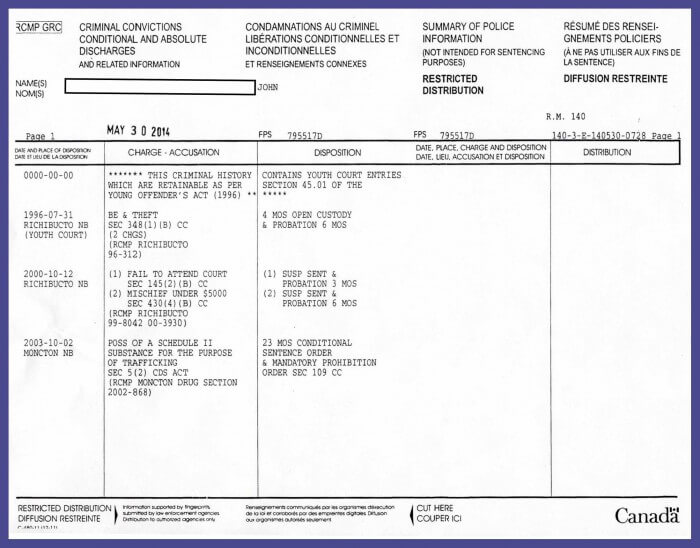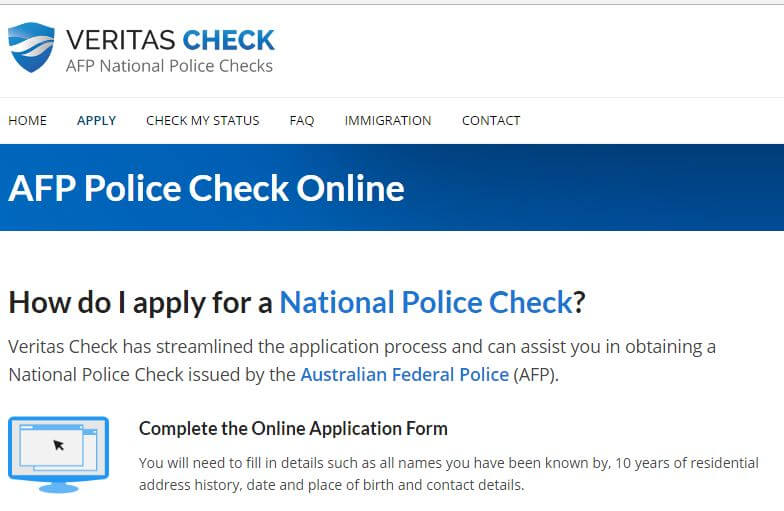Korean How-to Guide: Get a Korean E2 Visa
Getting your E2 visa is the final step in preparing to depart for Korea, but it can take months to gather all the necessary paperwork. Make sure to start the process early, and read this guide to understand every step.
Originally from Wisconsin, Lauren now lives in Brooklyn, New York. She finished her time in Korea, and is currently publishing a book on transitioning from West to East. This article, on getting an E2 visa, is an excerpt from that book.
Congratulations! You’ve completed your application, aced your interview, and now someone wants to hire you. Next up: Scaling a mountain of paperwork through a forest of red tape to acquire your E2 visa. I would love to tell you it’s all easy, but that would be a lie. What you’re facing is the equivalent of a trip to the DMV— except on an international level.
Listed below is the paperwork you’ll need but, just to make it easy, that paperwork will vary not only by country, but also by state. On top of that, certain documents can take months to procure, meaning you often have to start gathering these documents well before you even apply for a job. You’d best get to it! Here they are:
- Required Documents
- Criminal Background Check (CBC)/Criminal Record Check (CRC)/Police Clearance Certificate/etc. (varies by country)
- Authenticated/Apostilled Copy of Degree Parchment
- Sealed university transcripts
- A copy of your signed contract
- A personal health statement
- Your passport
- OK, I have all my documents. Now what?
- What your E2 visa means for you
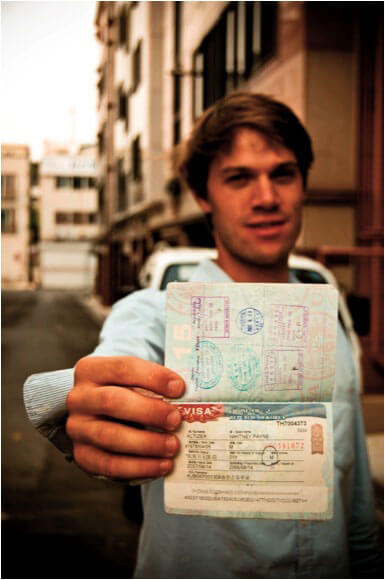
This is the goal, right here
Criminal Background Check
An authenticated background check from the highest law enforcement group in your country. The details of this vary by country.
Obtaining your background check can take up to three months, and also requires the additional, time-consuming step of getting it apostilled, so I recommend getting started on it months before you even begin to apply for jobs. Keep in mind that these are also only valid for 6 months, so if it takes longer than that for you to find a job teaching in Korea, you may need to obtain a new background check.
For All Nationalities: Apostilles
Once you receive your background check, you will need to get it apostilled. “What is an apostille?” you may be asking yourself: Good question. It is an international form of authentication, from your government to the government of Korea, and it will prove that your documents are too legit to quit.
Canadians are the only exception to this rule, as the Canadian government is not signatory to the De La Haye convention, which established the use of apostilles. Canadians will have to take their original documents to the Korean embassy to have them ratified. Call ahead to check requirements.
For Americans, Apostilles must be secured in the state where the document originated. This means that your original FBI background check (no copies!) needs to be apostilled by the US Department of State. There are a few ways to get your document apostilled:
If you’re sick of the paperwork already, you can hire a company to do this, but most Americans will choose to request an apostille by mail.
- A Request of Authentifications Service Form (DS-4194)
- Your FBI background check
- A money order or check made out to the US Department of State (at the time of writing, $8.00)
- A self-addressed, pre-paid envelope
to:
U.S. Department of State
Office of Authentifications
518 23rd Street, NW – SA -1
Columbia Plaza
Washington, DC 20520
It takes 3 days from receipt of the package for the US Department of State to process your document, so factor this, as well as the return mailing time, in to your plans.
Korean E2 Visas for Americans:
For the most up-to-date information on obtaining an FBI background check, visit this link. You may obtain a copy of your FBI background check in one of two ways:
Requirements : At the time of writing (April 2014), the fee for a FBI background check is $18. I’d recommend adding a sticky note on your application, saying that you need the FBI background check authenticated for an apostille. Check this handy FBI checklist before you close your envelope.
- By submitting your own application along with a set of fingerprints and payment. Fingerprints can be obtained at most police stations, but call ahead first and ask whether they provide this service. You will need to submit a standard FBI fingerprint form (FD-258) to get your fingerprints; pay attention to this, as there may be more than one fingerprint form to choose from there. Payment for your FBI background check can be submitted through the credit card payment form available here, or through a cashier’s check or money order made payable to The Treasury of the United States. Mail your signed application form, completed FD-258 fingerprint form, and your payment to:
FBI CJIS Division – Summary Request
1000 Custer Hollow Road
Clarksburg, WV
26306
- Secondly, you can hire an FBI-approved channeler to do this for you. It’s more expensive, but probably easier. They might even take care of the apostille step for you.
Korean E2 Visas for Canadians:
Canadians must secure a national-level, fingerprint-based background check from the RCMP, verified by the Korean Consulate with a Consulate Verification Stamp. Your background check can be obtained through an electronic fingerprint submission, which takes between 5 and 10 days. Starting in mid-2014, fingerprints submitted by paper will no longer be accepted.
To submit electronically, you can hire a private service, or you can ask your local police station if they have digital fingerprinting available. If you are outside of Canada, you should obtain your fingerprints as a rolled and flat impression of all ten fingers on a form that has your full name, date of birth, and gender, as well as the name and address of the police agency and the signature of the official taking the fingerprints. A third party can digitize ink fingerprints and submit them electronically to the RCMP.
Your application should mention specifically that you are seeking a background check for international employment in Korea, along with the official job title you have been given. It should also include your full name, date of birth, gender, mailing address, phone number, and your email address, as well as the name of the official taking your fingerprints and their signature. If submitting by mail, send it to:
Director General Canadian Criminal Real Time Identification Services RCMP,
NPS Bldg. 1200 Vanier Parkway
Ottawa ON
K1A 0R2
or by courier:
Director General Canadian Criminal Real Time Identification Services RCMP,
NPS Bldg., Loading Dock #1 1200 Vanier Parkway
Ottawa ON
K1A 0R2
This is your website.
Korean E2 Visas for the Irish:
There are two background checks for the Irish. One is for teaching kids in Ireland. This is not the one you need; that takes three months. The one you want is called a Police Check Certificate, and usually only takes a few weeks to obtain. It does need to be apostilled before it can be used to obtain your E2 visa. To obtain your Police Certificate, you must make an application in writing to the Superintendent in your district.
The application should include
- Your full name
- Date and place of birth
- Current address, and all addresses in which you’ve lived in Ireland
- A message that you are seeking this for a teaching position in Korea
- A self-addressed, postage-paid envelope
Once you obtain your background check, you must get it apostilled. Call the office to determine whether or not they require you to notarize the document, as well as for the applicable fees.
Korean E2 Visas for the British:
There are four different types of criminal records for British teachers:
- Basic Disclosures
- Standard Disclosures
- Enhanced Disclosures
- Subject Access Reports
Of all of these, the Basic Disclosure is the cheapest and the fastest to obtain. You can apply online if you currently reside in the UK and have been living at your address for 12 months. If you do not meet these requirements, you can submit a paper application. The fee is £25 paid by credit or debit card. You will need to submit a utility bill at your home address, your former addresses for the past 5 years, a copy of your passport, and your employer’s details in addition to the form, mailed to:
[blockquote align=”center”]Disclosure Scotland (from anywhere in the UK)
Basic EHU
PO Box 250
Glasgow, G51 1YU
Once you obtain your background check, you will need to have it apostilled. Call the office first to determine whether or not you need it to be notarized before they can apostille it for you.
Here’s your website.
Korean E2 Visas for Australians:
Aussies call their background checks Police Checks or Police Certificates. You’re looking for the Federal Level Police Check, which means that it’s conducted on a national level. You also need an apostille seal before you can use this for your E2 visa. (Call your apostille office and ask if they require your background check to be notarized before they apostille it.) Your fingerprint portion takes 30 days, while your background check takes 15 working days from receipt.
Fingerprints should be obtained from your local police jurisdiction. You must submit the original fingerprints; sadly, Livescan prints are not accepted. Applicants within Australia can also make an appointment to have their fingerprints taken by calling 02 6245 7351.
Applications for the background check can be submitted either online (you must print the application, sign it, and scan it back in), or by downloading the form and submitting it via post to:
Australian Federal Police
Criminal Records
Locked Bag 8550
CANBERRA CITY ACT 2601
Fees must be paid using Visa, Mastercard, or American Express or, if submitting a manual application by mail, a bank cheque in Australian dollars made out to the Australian Federal Police or a money order from the Australia Post. For more information, this is the link for you.
Once you receive your background check, you must get it apostilled. This can be done by couriering your original background check to the apostille office of the state you are in along with the appropriate fee. This can be paid by money order, certified cheque, or a credit card authorization form (you must request this via email from the apostille office). You will also need to include a self-addressed, registered, or express post envelope. You may also deliver the original background check in person in the state in which you reside. Generally, the fee for this will be $60.
Korean E2 Visas for New Zealanders:
Teachers hailing from New Zealand need to get their hands on a copy of a Federal Level Police Clearance, apostilled. This takes approximately 20 days from the time of receipt. Complete and sign the “request by individual for a copy of any criminal convictions (Priv/F1) form”. Add a copy of your valid drivers’ license or passport with current signature.
You will need to attach a cover letter that says you are going to work as a teacher in South Korea, that your background check must come to you on original letterhead with an ink signature, and that you give the Ministry of Justice permission to forward your document to the Department of International Affairs so that they can apostille it for you. There is a fee for the apostille service, which can be determined by contacting the Authentication Unit of the Department of Internal Affairs at 0800 872 675. Applications can be scanned and emailed to [email protected], faxed to +64 4 918 8974, or sent via post to:
Criminal Records Unit
Ministry of Justice
SX10161
Wellington
For more information, this is your website.
Korean E2 Visas for South Africans:
If you’re from South Africa, you need a Police Clearance Certificate apostilled by the South African Department of Foreign Affairs. The Criminal Record Centre in Pretoria allows you to specify that you need your document apostilled in your application; they have the ability to send it to the Department of Foreign Affairs – Legalisation Section before it comes back to you, saving you time and money.
The process takes six to eight weeks (officially, but often longer in practice: Ed.). You must submit an application letter to SAPS Criminal Record Centre with the following information:
- Surname
- Maiden name (if any)
- Given name
- Date of birth
- Place of birth
- South African ID number
- Last residential address in South Africa
- Last employer’s address and phone number
Then submit a full set of fingerprints obtained from your closest police station, a copy of your ID/passport, a fee of ZAR59-00 in the form of a bank cheque, bankers draft, money order or electronic payment into the South African Police Service account, as well as a self-addressed and franked envelope. Mail this to:
The Head (Attention: Police Clearance Certificates)
Criminal Record Center – SAPS
1st Floor, Room 14 Botongo Plaza West
271 Schoeman Street
Pretoria, 0001
For more information, this is your website.
Apostilled/Authenticated Copy of Degree Parchment
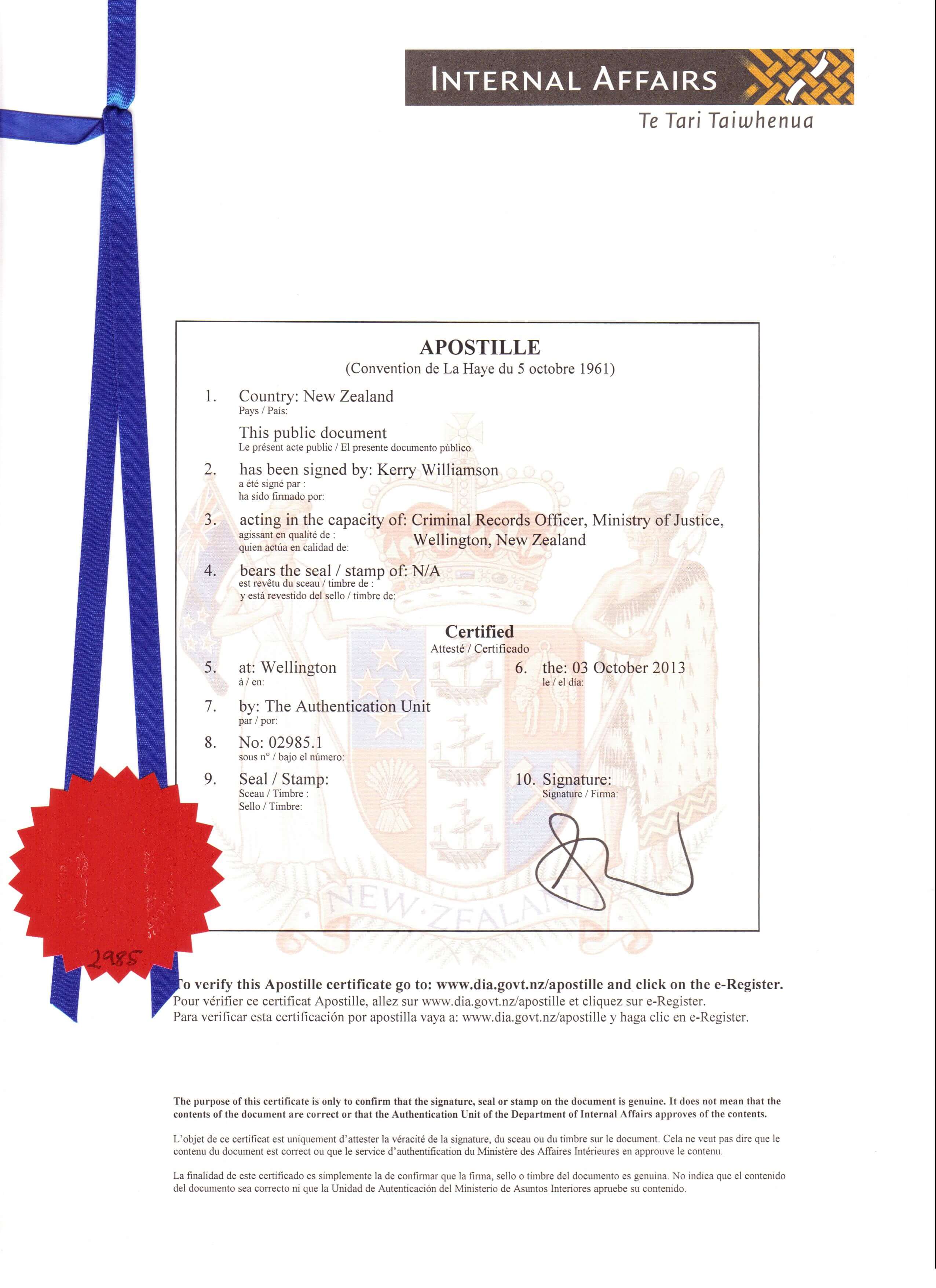
An apostille certificate – you will need two, one for each of your police clearance certificate and degree copy.
To obtain your E2 visa in South Korea, you must have completed a 3- or 4-year university degree from a college in America, Canada, the UK, Ireland, Australia, New Zealand, or South Africa, and to get a copy of your degree parchment authenticated (Canada) or apostilled (other countries).
Fees and processes vary by country. Americans should keep in mind that documents must be authenticated in the state where they originate. This means that if you went to school in Washington but now live in New York, your degree must still be apostilled in Washington. Canadians are required to get their degrees notarized, attach a Notarial Certificate, and then obtain a certification from a Korean diplomatic office. As always, before you head to your local office, it is recommended that you call first to determine what you need to bring. Phones are your friend when it comes to the lengthy E2 visa process.
Sealed University Transcripts
Officially, Korea stopped requiring these in 2010. Unofficially, you may still be asked to provide two sealed university transcripts when applying for your E2 visa at your local Korean consulate. Call your university and ask how to go about receiving these, and tell them it is for an international job. Kill two birds with one stone and ask them about getting a copy of your university degree notarized while on this phone call.
Copy of your signed contract
You should receive several copies of your contract by mail once you have accepted a position. Keep one in a safe place, for your own records, and sign another for submission either to the consulate when applying for your visa, or to your new employer in Korea, who will use it to apply for a visa number on your behalf.
If you’re due to leave for Korea, but haven’t yet received a contract, speak to your recruiter. It’s not necessarily a bad sign (things in Korea are notoriously last-minute), but could lead to a delay in your departure date.
Personal Health Statement
Before you are allowed to teach English in South Korea, you must be deemed physically and mentally stable enough to do so. The health statement is the first step in a process that will include a mandatory health test once you arrive. Keep a copy for your own records, and be prepared to submit others either to the consulate or your employer.
Passport and Passport Photos
You will need to submit your passport together with passport photos to the consulate when you apply for the visa proper. You will probably also send a scan/copy of your passport biographic page to your new employer.
Get 6 passport photos. You will need a couple of them for your E2 visa application, and several more for your Alien Registration Card (“ARC” for short) once you arrive in Korea.
Okay, I have my documents. Now What?
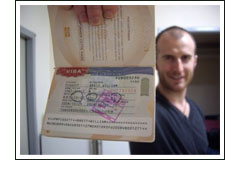
Looks like this guy just got his E2 visa!
Speak with your recruiter, they’ll know what you need to do next.
Most likely, you’ll be sending most of these documents (all but your actual passport, do not give this to anyone but the embassy/consulate) to your employer in Korea. They’ll use them to apply for an E2 Visa verification number on your behalf, which will be issued in the form of a certificate, with the number on it.
Korean Embassies in Korea. It may seem odd at first, but the closest Korean embassy or consulate for those already in Korea is most likely in Fukuoka, Japan – this is the origin of the famed “visa run”[/note]If you have that number, get in touch with the closest Korean embassy or consulate to ask them what additional documents they need, and whether you’ll need an in-person interview (officially, all first time E2 visa holders are required to do an in-person interview; unofficially, it’s a different story). Make sure you have all of your employer’s contact information too, because you will need to list them as your contact in Korea.
Once you have all those ducks in a row, congratulations, you’re nearly done! Send in your passport, passport photos, visa verification number, the E2 visa application form, and any other necessary documents to your most convenient Korean consulate or embassy, for them to affix the visa. It’ll come in the form of a sticker that takes up a full page of your passport.
Before you send anything, make copies of everything!
What your E2 visa means for you
Your visa entitles you to a stay of up to 2 years, although it is more likely to be 13 months; this is dependent on the contract you sign. Your E2 visa links you to the hagwon or school in Korea that you signed a contract to work for. What this means is that you are allowed to be in Korea because you have created an official relationship with this institution; you agree to work for this institution and this institution alone. You will be able to add other employment places to your E2, so long as your employer does not change.
Your E2 visa prohibits you from switching jobs, from subbing, and from picking up additional employment on the side. This means no tutoring, no running your own business out of your studio apartment, and no moonlighting at the noraebang. (You are allowed to teach English to your colleagues at the organization though, as well as volunteer your services without profit.)
This is one of the reasons to be absolutely sure that the place you’ve signed a contract with is the place you want to be, because getting out of that contract has the potential to be stickier than a small child covered in pudding and glue. (Also, side note, you’re sure you want to work with kids, right? Because they quite frequently are covered in pudding and glue.) You can switch hagwons only if you are given a letter of release from your current employer, and hagwons tend not to be too quick to hand these out.
Your other visa options
D-10: A Job Seekers Visa
The D-10 visa allows you to stay in Korea for up to 6 months if you are seeking employment as an English teacher. While most English teachers find employment and apply for the E2 visa in their home country before going out to Korea, coming to Korea on a D-10 first is actually quite an appealing option. By doing so, you can meet your potential employers, scope out cities you want to live in, and see what Korea is actually like on the ground. After all, it’s much easier to decide if a place is right for you when you experience it in person—the school and the country both.
This is also an ideal visa to switch to for someone who just finished his or her contract in Korea and wants a little time to decide where to go next. Keep in mind that you are ineligible for a D-10 visa if you worked in Korea previously and did not finish your contract term. In theory this is on good faith and, if your previous employer was the reason you quit, you are still eligible, although theory and practice can be two entirely different things in Korea.

If you try looking for a job in Korea without that D-10 visa, you’re going to have to do a visa run to get your E2 visa. I can think of worse ways to spend time, though
Are you having any problems with the visa process? Let us know in the comments below, or send us a message using the form on the right. We love mail!
